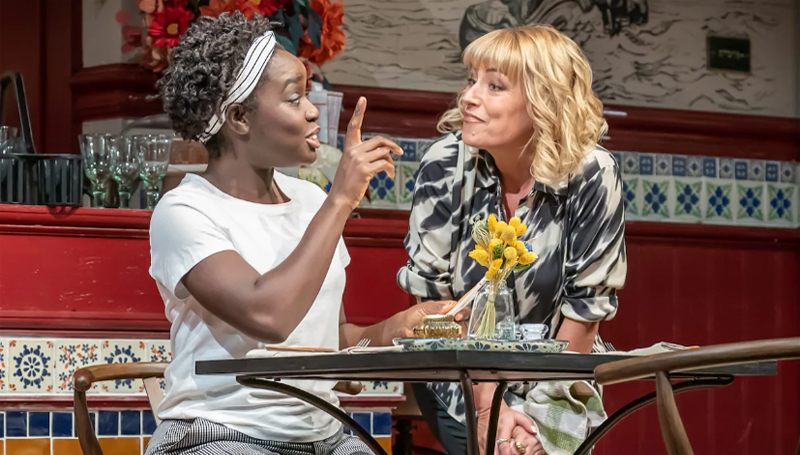“Kerry Jackson”, National Theatre, Dorfman
Simon Jenner on the South Bank
9th December 2022
In April De Angelis’s new play, Kerry Jackson, opening at the National Theatre’s Dorfman directed by Indhu Rubasingham, you sometimes feel a tragedy is wildly signalling to be let out.

Kitty Hawthorne and Gavin Spokes.
Photo credit: Marc Brenner.
De Angelis is consummate at pointing up the way comedy teeters on the brink. And her trademark brilliance with toe-curling embarassment scores twice here. That unforgettable moment in Jumpy – a naked young man strolling through the kitchen – arrives with ageism: what a daughter thinks appropriate for her mother. This time jokes explore class fissures, and De Angelis turns it fully on people like herself: leftish-liberal Stephen, sometimes antagonist to the eponymous character, sometimes anything but.
Aspiring 52-year-old Essex-born Kerry Jackson (Fay Ripley) bestrides her new Walthamstow Village tapas bar El Barco like a colossus of attitude: working-class, Conservative, Brexit-voting, anti-rough-sleeper, occasionally anti-immigrant but reliant on “mate” and cooking/accountancy genius Athena (Madeline Appiah) whom she poached from another bar. Kerry seems almost scapegoated with identities De Angelis can accuse most of the audience, like herself, of not possessing. Which verges on class judgement seen from the outside: “mean and small-minded” as one middle-class person indeed dismisses Kerry, before partially recanting.
To offset this De Angelis energizes her creation with a power Ripley blazes into being: singing Abba, flouncing with outrageous flamenco dresses, turning to fury and – too late – trying to stuff words back into her mouth. Or cause at one crucial stage someone else to spit their food out again. Food, as you’d expect – and particularly drink – infuse every delicious plot twist.

Fay Ripley as Kerry.
Photo credit: Marc Brenner.
It’s enormously engaging, though being a comedic type Kerry’s fissures aren’t explored. Or modulated from some experience. Dramatists: they fill you with faults they don’t have, and add some extra, just for you. Including, we’re told, having “Dave” tattood near her coccyx. Throughout this riveting two and a half hours, one recalls De Angelis’s avowed intent to create her mirror opposite; then the opposite to that, philosophy teacher Stephen (Michael Gould), and that now recognizable De Angelis character, the late-teen daughter.
Alice (Kitty Hawthorne) can give Ab Fab’s Sappho a run, and is wholly believable in Hawthorne’s hands, in her watchfully poised stage debut: irritatingly self-righteous, but right, vulnerable, and here grieving, as is Stephen, for the loss of her mother Anna (“practically perfect in every way”). Alice stands for sanity and balance more than her father, telegraphing grief by telling a homeless man, Will, that having grown an inch since her mother died, “She’ll never know the actual height I end up.”
Indeed Stephen’s response to grief is his most authentic suit too. Gould invests him with just the right traits: hesitating dislike, hesitating doing good that goes horribly wrong, hesitating a restaurant review, hesitating sex, hesitating another favour – to help get rid of homeless Will (Michael Fox) defecating behind the restaurant bins. It’s a strong performance, edged only with the sudden lurches De Angelis gives Stephen towards bias when his character’s moved sympathetically elsewhere. The dice occasionally seems loaded against him, even more towards Kerry.
As Kerry tells Stephen, “Sometimes I don’t think we speak the same language.” Especially after he’s earlier patronized her at length as a “Conservative personality”. Class clashes depth-charge those tenatative pacts made across the (sometimes too schemtatic) divide: Kerry will give Alice a job if Stephen removes Will somehow. Naturally Stephen unbends too when confronted with lines like, “Opposites attract. Schopenhauer said that.”
There’s also repeated lines: “I don’t trust you” – Will to Stephen, Athena to Kerry later. Trust, secrets, responsibilities – De Angelis powers this comedy by ensuring everyone tugs at a cat’s cradle of secrets, even Stephen’s from Alice.
But then Stephen mentions “defrosting” – emblematic as in a further exchange Kerry hopes Stephen will replace El Barco’s “menopausal” fridge. Except his unannounced rival Warren (Gavin Spokes), an ex-policeman – cue a smorgasbord of racism, ASBOs for Will, calling Alice a “snowflake” and a memory of speed-dating her Kerry can’t recall – offers one too.
Rubasingham’s pacey direction ensures the first scenes don’t seem like a tennis match on a carousel. As Richard Kent’s El Barco with its red and terra-cotta interior and skylight (Oliver Fenwick’s lighting subtle and full of shadows) revolves to Stephen’s duck-egg-green modern kitchen, there’s an initial danger we oscillate between class duets and confrontational trios. But things intensify before Act Two, when Lucy Hind’s movement and intimacy directing plots a ballet through flamenco firecrackers.
It happens with Warren’s arrival: who thinks his USP – coming from a shared background with Kerry – is a clincher. Though De Angelis takes care to gift him with a hinterland involving Rodin at the Tate Modern, collecting potterines from the sneering rich and early retirement after trauma. Spokes continually upends assumptions – his unglazed lyricism invokes figurines – but only with Kerry.
With Will De Angelis almost springs a surprise but pulls back. Will – nicknamed “the reader” for turning a begging displacement-activity into a genuine habit – is biting and wary in Fox’s hands. Fox edges Will’s voice this side of medicalized speech, pushing away ready sympathy with demons. Traumatized from youth, a former user he claims, Will turns down food for money, interacting with Stephen and once Alice and Kerry. “We’re not on the same side,” he tells Stephen, who with Alice has just heard Will’s inveighing against “pregnant Romanians scamming the system” and extolling the death penalty. Yet there’s a parallel only Athena traces, scratching the merest outline in Kerry’s past.
Appiah’s cool, witty Athena simmers and rarely breaks cover as she explains early on: her academic father never bothered to register her residence properly, lending tensions that assert themselves rescuing Alice – who irritates her – then siding with her in a climactic scene. Which leads to another. Appiah’s marking Athena’s slow growth to authority is one of the truest things in the production.
It’s this pivotal tension between colleagues that most explores the prejudice, anger, betrayal of trust and how to address it, that underscores this latest play of De Angelis – making a hugely welcome return to the National in her own voice after adapting Elena Ferrante’s My Brilliant Friend (2019). Whilst I’m not sure about the coda, Kerry Jackson has comedy struck through it, and there’s affirmation as well as reckoning in Ripley’s enormous yes to it all.









